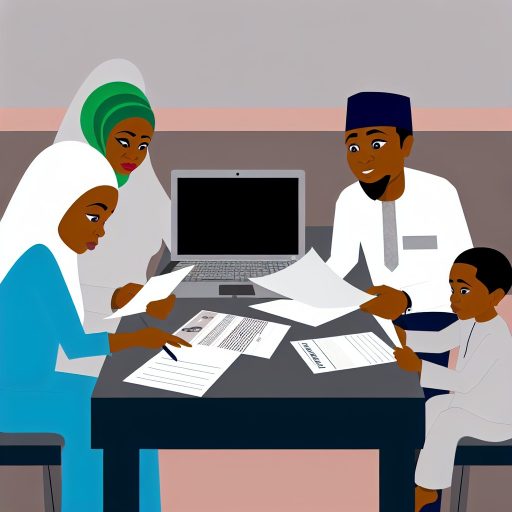Understanding the Importance of Flexibility in Parenting within the Nigerian Cultural Context
The Role of Cultural Diversity in Parenting
Nigeria hosts diverse ethnic groups with unique parenting traditions.
Therefore, parents often blend customs to raise well-rounded children.
Consequently, flexibility allows families to honor traditions while adapting to change.
This adaptability supports children’s growth in a multicultural environment.
Balancing Traditional Expectations and Modern Challenges
Many Nigerian parents value respect, discipline, and family loyalty.
However, urbanization and globalization introduce new parenting challenges.
Thus, parents must adjust strategies to address education and technology shifts.
In addition, flexibility helps parents navigate expectations from elders and schools.
Benefits of Flexible Parenting Approaches
Flexible plans promote open communication between parents and children.
They also encourage mutual understanding and respect within families.
Moreover, flexibility helps parents respond to children’s individual needs effectively.
This approach fosters resilience and emotional well-being in Nigerian youth.
Practical Ways to Incorporate Flexibility
- Parents like Mrs. Folake Ajayi include regular family discussions on rules and values.
- Mr. Chinedu Eze advises adjusting routines based on children’s school and social activities.
- Families benefit from involving extended relatives but setting clear communication boundaries.
- Coordinating with teachers and community leaders supports balanced development.
Building Supportive Networks for Adaptive Parenting
Community groups in Lagos and Abuja offer parenting workshops.
These programs highlight the importance of balancing culture and flexibility.
Additionally, parents learn practical skills to manage conflicts and expectations.
Parenting Made Just for You
Get personalized Parenting Solutions tailored to your child’s needs. Transform your parenting journey with expert guidance in 1-3 days.
Get StartedEngaging with these networks strengthens parental confidence in diverse environments.
Assessing Family Dynamics and Individual Needs
Understanding Family Structure and Roles
Nigerian families often have unique structures shaped by culture and tradition.
Recognizing each member’s role helps in creating a more effective parenting plan.
For example, in some households, grandparents play a major caregiving role.
Therefore, consider extended family involvement when tailoring parenting strategies.
This understanding promotes harmony and respect among family members.
Identifying Children’s Individual Needs
Every child has distinct needs and personalities that influence parenting methods.
First, observe each child’s behavior, learning style, and emotional responses closely.
Additionally, medical conditions or special requirements must be carefully accounted for.
Consult professionals like pediatricians or counselors when necessary to gain insights.
Addressing these needs directly improves child development and well-being.
Evaluating Parents’ Strengths and Challenges
Parents must honestly assess their strengths and areas needing improvement.
Open communication between partners helps identify how to support each other best.
For instance, understanding work schedules and stress factors aids flexibility in planning.
Unveil the Perfect Name that Tells Your Family's Story
Let us help you find a name that embodies your family's values, traditions, and dreams. Our personalized consultation weaves cultural insights to create a name that's uniquely yours.
Get StartedMoreover, acknowledging parenting challenges opens opportunities for growth and learning.
This evaluation ensures that the plan stays realistic and sustainable over time.
Incorporating Cultural Expectations and Values
Nigerian culture heavily influences parenting styles and expectations.
Respecting traditions while remaining adaptable creates a balanced parenting plan.
Discuss values such as respect for elders, religious practices, and community involvement openly.
Also, be prepared to adjust practices based on changing family circumstances and children’s needs.
This balance nurtures identity while promoting healthy child development.
Collaborating to Develop a Tailored Parenting Approach
Involve all key family members in discussions about the parenting plan.
Collaboration fosters mutual understanding and shared commitment to parenting goals.
Use regular family meetings to review progress and make necessary adjustments.
Additionally, consider input from trusted community leaders or family friends for support.
This cooperative approach strengthens family bonds and ensures flexibility.
Incorporating Traditional Values Alongside Modern Parenting Approaches
Honoring Cultural Heritage
Nigerian parents deeply value their rich cultural traditions.
They emphasize respect, family loyalty, and community involvement.
Furthermore, they pass down stories, proverbs, and ceremonies to children.
This connection provides children a strong identity and sense of belonging.
Therefore, incorporating these elements into parenting remains essential today.
Integrating Modern Parenting Practices
At the same time, Nigerian parents increasingly adopt modern parenting methods.
These approaches include positive discipline, emotional support, and open communication.
Moreover, parents focus on education, mental health, and fostering creativity.
Importantly, these practices encourage critical thinking and independence in children.
Consequently, combining new ideas with tradition prepares children for a changing world.
Balancing Tradition and Modernity in Daily Parenting
Parents can create flexible routines that respect both cultural norms and new values.
For example, elders’ advice can complement teachers’ guidance and peer interactions.
In addition, celebrating festivals while encouraging personal expression empowers children.
Additionally, families arrange dialogues to discuss tradition and modern challenges.
This balance helps children develop respect and adaptability simultaneously.
- Encourage children to learn indigenous languages and customs at home.
- Promote questioning and exploration alongside respect for elders.
- Use stories from both cultural heritage and contemporary sources.
- Model empathy, patience, and understanding in everyday interactions.
- Stay open to new parenting resources and community support groups.
By integrating these steps, parents nurture well-rounded and confident children.
Delve into the Subject: Why Delegating Tasks Can Help Improve Family Harmony
Setting Realistic and Adaptable Goals for Child Development and Education
Understanding the Importance of Flexible Goals
Parents like Chinedu and Adaobi need clear yet flexible goals to guide their parenting journey.
Flexible goals allow adjustments based on a child’s unique growth pace and personality.
Moreover, Nigerian parents face diverse challenges that require adaptable strategies.
Setting unrealistic goals often leads to frustration for both parents and children.
Therefore, balancing ambition with practicality fosters a healthier development environment.
Identifying Realistic Goals for Child Development
Parents should observe their children’s strengths and areas needing improvement first.
For example, Musa’s parents noticed his artistic talent and encouraged it alongside academics.
Setting achievable milestones, like improving reading skills over a semester, works well.
Parents must consider the child’s emotional, social, and physical development stages.
Additionally, engaging teachers such as Mrs. Ikpe to align school and home goals enhances progress.
Parents should avoid comparing their child to peers, focusing instead on individual growth.
Adapting Educational Plans to Changing Needs
Education goals must evolve as children like Sade grow and encounter new challenges.
Frequent review sessions help parents and educators adjust expectations effectively.
For instance, when Sade struggled with math, her father, Obinna, sought tutoring support promptly.
Changes in school curriculum or family circumstances also require goal reassessment.
Parents should remain open to expert advice from counselors or child psychologists.
Furthermore, communication between parents and children supports understanding of the goals.
Strategies to Maintain Flexibility and Realism
Start by writing down broad development objectives with room for adjustment.
Next, break those objectives into smaller, manageable weekly or monthly targets.
Use progress checklists that both parents and children can review together.
Encourage children to express their thoughts about their goals and educational activities.
Celebrate small achievements to motivate continued effort and positive attitudes.
Finally, maintain patience and understanding, remembering parenting is a dynamic process.
Resources to Support Goal Setting
Nigerian parenting groups and forums offer valuable advice and shared experiences.
Educational centers like Lagos Learning Hub provide workshops on child development.
Books by Nigerian educators such as Ifeoluwa Adebayo offer culturally relevant guidance.
Online platforms with tailored content for Nigerian families assist in adaptive planning.
Collaboration with school teachers remains essential to creating cohesive goals.
See Related Content: Simple Tips for Balancing Parenting With a Demanding Career
Balancing Work, Community Involvement, and Parenting Responsibilities
Managing Professional Commitments Effectively
Nigerian parents often juggle demanding work schedules alongside family duties.
Creating a realistic work routine helps maintain a healthy balance.
Employers like Avila Tech Hub prioritize flexible hours to support parenting staff.
Therefore, parents like Folake can attend school events without compromising work.
Remote work options reduce commuting stress and increase family time.
Engaging in Community Activities Thoughtfully
Community involvement forms a vital part of Nigerian family life and culture.
Parents such as Emeka volunteer at local youth groups while managing their families.
Setting boundaries around time spent on community work ensures family priorities stay intact.
Joining neighborhood committees in moderation allows participation without overwhelming commitments.
Involving children in community events builds social skills and shared experiences.
Coordinating Parenting Duties Within the Family
Effective parenting requires clear communication and shared responsibilities among caregivers.
Couples like Ifeoma and Chuka divide childcare tasks based on their strengths and availability.
Using calendars helps their children, Obinna and Chioma, understand schedules and anticipate routines.
Grandparents and extended family members often provide crucial support in childcare.
Involving trusted relatives enhances flexibility and reliability in parenting plans.
Practical Tips for Creating a Flexible Parenting Plan
- Set realistic goals for work, family time, and community participation.
- Prioritize activities and delegate when possible to lighten individual burdens.
- Communicate openly with employers about parenting needs and seek accommodations.
- Schedule regular family meetings to adjust plans collaboratively as situations change.
- Use technology like shared calendars or task apps to keep everyone informed.
- Encourage children to express their needs, fostering mutual understanding within the family.
Explore Further: Work-Life Balance Hacks for Nigerian Parents in Fast-Paced Urban Settings
Developing Effective Communication Strategies for Family Members
Building Open and Honest Dialogue
Effective communication begins with open and honest dialogue among family members.
Parents like Funmi and Emeka encourage their children to express feelings without fear.
This transparency creates a safe environment for everyone to share thoughts clearly.
Moreover, active listening strengthens trust within the family unit.
Therefore, family members should focus on understanding before responding.
Establishing Regular Family Meetings
Regular family meetings help maintain consistent communication channels.
For instance, Amina and her husband hold weekly discussions to plan schedules and address concerns.
These meetings offer a platform to solve conflicts amicably and make collective decisions.
Additionally, they reinforce the importance of everyone’s voice in family matters.
Consequently, these gatherings minimize misunderstandings and build unity.
Using Positive and Respectful Language
Choosing positive and respectful words fosters healthier interactions within families.
Chinedu advises his siblings to avoid blame and criticism during disagreements.
This practice reduces defensiveness and encourages problem-solving attitudes.
Furthermore, respectful language supports emotional well-being and nurtures love.
Hence, Nigerian parents can cultivate patience and kindness in everyday conversations.
Incorporating Technology for Connection
Modern technology offers various tools to improve family communication.
Sade uses video calls to stay connected with her children while working abroad.
Social media chat groups help relatives share updates quickly and easily.
However, families should set boundaries to prevent overuse and distraction.
Thus, technology can enhance bonding when used thoughtfully and intentionally.
Encouraging Empathy and Understanding
Empathy plays a crucial role in effective communication among family members.
Olu encourages his teenagers to consider each other’s perspectives during conflicts.
This approach helps reduce resentment and promotes mutual respect.
Learning to pause and reflect before reacting strengthens family relationships.
Ultimately, empathy builds a supportive environment where everyone feels valued.
Developing Conflict Resolution Skills
Addressing disagreements constructively prevents long-term family tensions.
Successful parents like Ifeoma teach their children negotiation and compromise techniques.
Families should establish clear rules for resolving conflicts calmly and fairly.
Using “I” statements helps express feelings without assigning blame.
Therefore, conflict resolution becomes a tool for growth rather than division.
Promoting Cultural Values and Traditions
Shared cultural values strengthen communication and family bonds.
Nigerian families often use proverbs and storytelling to convey important lessons.
Tunde and his mother engage children with traditional folktales that highlight respect.
Such practices reinforce identity and create common understanding among generations.
Besides, cultural traditions provide a framework for expressing family expectations clearly.
Supporting Emotional Expression
Allowing all family members to express emotions openly reduces stress and misunderstandings.
Yewande encourages her children to share joys and challenges without hesitation.
This openness fosters emotional intelligence and deeper connections.
Parents must acknowledge feelings and validate experiences to build trust.
Hence, nurturing emotional expression is vital for a harmonious family life.
Uncover the Details: Time Management Tips for Busy Nigerian Parents to Achieve Harmony

Creating Contingency Plans for Common Challenges Faced by Nigerian Parents
Managing Educational Disruptions
School closures and strikes often disrupt children’s education in Nigeria.
Parents should prepare alternative learning methods in advance.
For example, Mrs. Chioma Adesina recommends creating a home study routine.
She suggests using online educational resources regularly.
Parents can also coordinate with other families for group lessons.
Tutoring sessions among peers provide additional learning support.
Moreover, investing in educational materials such as books and tablets offers flexibility.
Parents must communicate regularly with teachers to track progress remotely.
Handling Healthcare Emergencies
Sudden illnesses and limited access to healthcare challenge many Nigerian families.
Having a clear emergency plan reduces stress during health crises.
Dr. Emeka Nwafor advises keeping a list of nearby hospitals and clinics.
Parents should keep a first aid kit readily available at home.
It also helps to know emergency contact numbers for health services.
Family members can be assigned responsibilities to manage urgent situations effectively.
Addressing Financial Instability
Fluctuations in income affect parents’ ability to provide consistently.
Creating a savings plan helps Nigerian parents prepare for unexpected expenses.
Mrs. Amina Bello suggests setting aside a small monthly emergency fund.
Parents should explore side businesses or freelance work as backup income.
Moreover, budgeting for essential items ensures better financial control.
Families can consult financial advisors like Olumide Ajayi for money management.
Dealing with Transportation Challenges
Traffic congestion and unreliable transport disrupt daily parenting schedules.
Parents ought to plan alternative routes for school runs and errands.
Mr. Tunde Akintola recommends coordinating carpool arrangements in the community.
Using ride-hailing apps provides convenient transport when public transit fails.
Allowing extra travel time helps minimize stress caused by delays.
It is wise to keep a backup plan by arranging for trusted neighbors’ assistance.
Ensuring Child Safety in the Community
Safety concerns remain a priority for Nigerian parents in urban and rural areas.
Establishing neighborhood watch groups improves communal protection.
Parents like Mrs. Ifeoma Chukwu engage local leaders to address safety issues.
Teaching children personal safety rules prevents risky behavior.
Mobile tracking technology offers peace of mind for concerned guardians.
Parents should update emergency contact information accessible to caregivers.
Leveraging Community Resources and Support Networks for Flexible Parenting
Building Strong Connections Within the Local Community
Nigerian parents can enhance their parenting plans by tapping into local community resources.
Communities such as churches, mosques, and cultural groups offer valuable support systems.
For example, the Ikorodu Community Advancement Group organizes parenting workshops monthly.
Moreover, neighborhood childcare cooperatives provide shared caregiving responsibilities.
These networks help parents exchange advice and share childcare duties effectively.
Consequently, parents gain more flexibility and reduced stress in their daily routines.
Utilizing Educational and Health Services
Schools and health centers offer programs that support child development and family well-being.
The Lekki Community Health Center provides parenting classes focused on nutrition and child healthcare.
Likewise, public schools often host after-school clubs that nurture children’s interests safely.
Parents can rely on these services to supplement their caregiving efforts reliably.
Additionally, engaging with professionals ensures children receive expert guidance and care.
Engaging with Formal and Informal Parenting Groups
Parent-teacher associations serve as platforms to collaborate with educators and other parents.
The Lagos Mothers Network is a vibrant online group offering advice and emotional support.
In addition, informal neighbor networks foster trust and spontaneous help among families.
These groups enable flexible sharing of resources such as school runs and emergency babysitting.
Hence, parents create adaptable routines that respond to unpredictable life demands.
Accessing Government and Non-Governmental Organization Support
The Nigerian government and NGOs provide several valuable programs for families.
Agencies like the Family Assistance Program offer counseling and financial aid to parents.
Moreover, organizations such as the Mothers Empowerment Circle conduct skills workshops.
Participation in these programs equips parents to manage challenges proactively.
Therefore, leveraging such support strengthens parenting plans and promotes family resilience.
Strategies for Effective Collaboration and Resource Sharing
Parents should communicate openly about their schedules and childcare needs.
They can organize regular meetings with trusted community members to coordinate help.
Using mobile apps like FamConnect simplifies scheduling and resource sharing among families.
Furthermore, creating written agreements clarifies expectations and responsibilities clearly.
Through these approaches, parenting becomes a cooperative effort benefiting all involved.
Monitoring and Revising the Parenting Plan to Suit Changing Circumstances
Importance of Regular Review
Parenting plans must adapt to the evolving needs of children and families.
Regularly reviewing the plan ensures it reflects current realities.
It helps avoid misunderstandings and conflicts between parents.
As children grow, their needs and activities often change.
Parents should revisit agreements to support their children’s development effectively.
Signs That Indicate the Need for Revision
Changes in a child’s schooling or extracurricular interests may require plan updates.
Significant family events like relocation or job changes affect parenting arrangements.
Health issues or changes in a child’s emotional needs can signal a needed adjustment.
If parents struggle to follow the existing plan, it may need revision.
Open communication helps identify when the plan no longer works well for everyone.
Effective Methods to Monitor the Parenting Plan
Keeping a shared calendar improves coordination and keeps both parents informed.
Parents can set monthly or quarterly meetings to discuss the plan’s effectiveness.
Using communication apps tailored for co-parenting promotes clarity.
Recording observations about the child’s well-being supports informed discussions.
Mediator or family therapist involvement can offer neutral perspectives when necessary.
Steps to Revising the Parenting Plan
Both parents should openly discuss what changes are needed and why.
They must consider the best interests of the children at all times.
Propose specific modifications clearly to avoid confusion.
Parents might seek legal advice to understand the implications of changes.
Formalize the revision by updating the written plan and signing the agreement.
Encouraging Flexibility and Cooperation
Flexibility builds trust and fosters a positive co-parenting relationship.
Parents should remain open to feedback and willing to make adjustments.
Setting a cooperative tone lowers stress and benefits the children’s emotional health.
Flexible parents can better handle unexpected changes in schedules or needs.
Helping their children feel secure encourages healthy growth and family stability.
Encouraging Shared Parenting Responsibilities Among Extended Family Members
Recognizing the Role of Extended Family in Nigerian Parenting
Nigerian culture highly values the involvement of extended family in childraising.
Grandparents, aunts, uncles, and older siblings often contribute to daily care.
This shared responsibility provides children with strong support networks.
Moreover, it fosters a sense of community and belonging from an early age.
Families like the Okafors and Abubakars benefit greatly from this collective approach.
Benefits of Involving Extended Family in Parenting
Involving relatives reduces the parenting burden on mothers and fathers.
It also offers children diverse role models to learn from and emulate.
Furthermore, shared responsibilities can enhance emotional stability for the child.
Sharing childcare duties ensures that parents maintain better work-life balance.
Additionally, extended family involvement improves communication and cultural transmission.
Strategies to Foster Shared Parenting Responsibilities
Begin by identifying willing and capable extended family members to assist.
Schedule regular family meetings to discuss childcare schedules and needs.
Utilize elders like Mama Nkechi or Uncle Musa as trusted caretakers and advisors.
Create a clear plan that outlines roles and expectations for each family member.
Encourage open communication to address any concerns or changes in plans.
Overcoming Challenges in Shared Parenting Among Extended Families
Differences in parenting styles can cause misunderstandings within the family.
Therefore, hold discussions to align on key values and disciplinary approaches.
Respect for each member’s input fosters cooperation and mutual respect.
Additionally, addressing conflicts promptly prevents resentment and division.
Engaging a mediator like community elder Mrs. Olufemi can help resolve disputes.
Supporting Working Parents Through Shared Family Involvement
Shared parenting allows working parents like Mr. Emeka to focus on their careers.
It also helps mothers like Mrs. Fatima pursue personal development goals.
Extended family members can provide childcare during emergencies or busy times.
Moreover, this arrangement strengthens family bonds and resilience.
Employing this collaborative approach promotes healthier, happier family dynamics.




